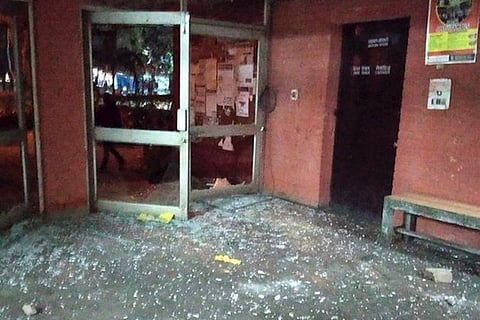

The wardens of the Sabarmati hostel at the Jawaharlal Nehru University resigned on Monday, stating in their resignation letters that they were quitting on "moral grounds" as they were unable to provide security to the hostel residents.
Sources close to wardens Ramavtar Meena and Prakash Chandra Sahoo, however, alleged that a group of students cornered them when they reached the hostel and accused them of not providing security.
The students made the wardens sign the resignation papers forcefully, the sources claimed.
The Sabarmati hostel on the JNU campus witnessed violence on Sunday as a group of masked people armed with sticks and rods barged in, attacking students and damaging property.
Meena and Sahoo said they had fled the campus after being threatened by the masked group.
On Sunday, masked people brandishing hockey sticks and iron rods unleashed mayhem, trawling through corridors and breaking into hostels, including those occupied by women. Delhi Police has registered a case against unidentified people for rioting and damage to property and the case was transferred to its Crime Branch.
34 people, including students and faculty members, who were admitted to the trauma centre of the All India Institute of Medical Sciences, were discharged on Monday morning, officials at the institute said.
JNUSU president Aishe Ghosh was among the four people who received head injuries in the violence.
The JNU administration had at first blamed ‘miscreants’ for the violence in a short statement, but then they later changed tack and blamed the students who have been fighting against the fee hikes in the university.
The protesting students – many of who were attacked on Sunday – have been running a civil disobedience movement inside the university, and blocking the registration process for courses, demanding that the administration roll back fee hikes before going ahead with the registration. JNU students' union, Left Unions and a large section of students have been a part of this protest.